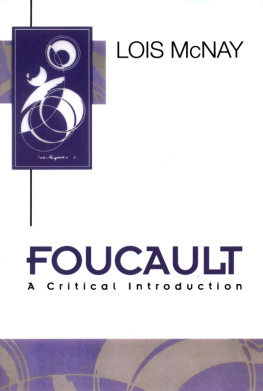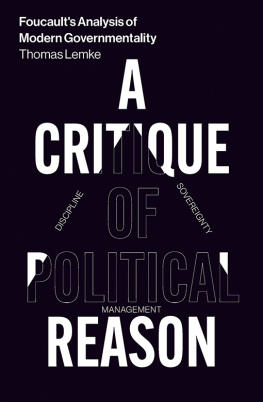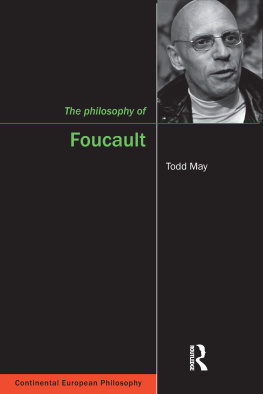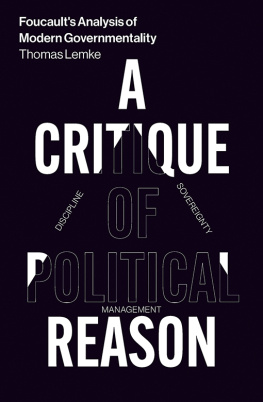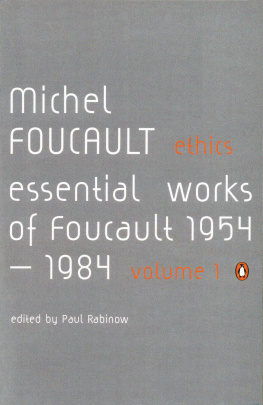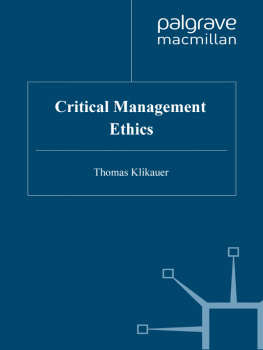FOUCAULTS CRITICAL ETHICS
just ideas
transformative ideals of justice in ethical and political thought
series editors
Drucilla Cornell
Roger Berkowitz
FOUCAULTS CRITICAL ETHICS
Richard A. Lynch
FORDHAM UNIVERSITY PRESS
NEW YORK 2016
Copyright 2016 Fordham University Press
All rights reserved. No part of this publication may be reproduced, stored in a retrieval system, or transmitted in any form or by any meanselectronic, mechanical, photocopy, recording, or any otherexcept for brief quotations in printed reviews, without the prior permission of the publisher.
Fordham University Press has no responsibility for the persistence or accuracy of URLs for external or third-party Internet websites referred to in this publication and does not guarantee that any content on such websites is, or will remain, accurate or appropriate.
Fordham University Press also publishes its books in a variety of electronic formats. Some content that appears in print may not be available in electronic books.
Visit us online at www.fordhampress.com.
Library of Congress Cataloging-in-Publication Data
Names: Lynch, Richard A., 1967 author.
Title: Foucaults critical ethics / Richard A. Lynch.
Description: First edition. | New York, NY : Fordham University Press, 2016. | Series: Just ideas | Includes bibliographical references and index.
Identifiers: LCCN 2015042263 (print) | LCCN 2016013129 (ebook) | ISBN 9780823271252 (cloth : alk. paper) | ISBN 9780823271269 (ePub)
Subjects: LCSH: Foucault, Michel, 19261984. | Ethics. | Power (Philosophy)
Classification: LCC B2430.F724 L96 2016 (print) | LCC B2430.F724 (ebook) | DDC 170.92dc23
LC record available at https://lccn.loc.gov/2015042263
Printed in the United States of America
18 17 16 5 4 3 2 1
First edition
for Stacy
Contents
All I have managed here, and it is more than I intended, is to give a confused statement of an intention which presumes itself to be good: the mere attempt to examine my own confusion would consume volumes. But let what I have tried to suggest amount to this alone: that not only within present reach of human intelligence, but even within reach of mine as it stands today, it would be possible that young human beings should rise onto their feet a great deal less dreadfully crippled than they are, a great deal more nearly capable of living well, a great deal more nearly well, each of them, of their own dignity in existence, a great deal better qualified, each within his limits, to live and to take part toward the creation of a world in which good living will be possible without guilt toward every neighbor: and that teaching at present, such as it is, is almost entirely either irrelevant to these possibilities or destructive of them, and is, indeed, all but entirely unsuccessful even within its own scales of value.
James Agee
Mais quest-ce donc que la philosophie aujourdhuije veux dire lactivit philosophiquesi elle nest pas le travail critique de la pense sur elle-mme?
But, then, what is philosophy todayphilosophical activity, I meanif it is not the critical work that thought brings to bear on itself?
Michel Foucault
Foucault disconcerts, as Charles Taylor memorably put it (Taylor 1984, 152). The opening image of Discipline and Punish, for example, in which eyewitness accounts retell in graphic detail the difficult and violent 1757 execution of the regicide Damiens, jars readers, piquing our attention if we are not entirely repulsed. Perhaps more profoundly disconcerting than this initial description, however, is Foucaults suggestion that beneath the apparent humanization of punishment since the eighteenth century there is a transformation in the mechanisms of social control, mechanisms that now subject each and every member of society to a constricting web of observation and normalization. The operation of modern power, which Foucault describes in rich detail, is itself disconcerting. The fact that we are disconcerted by Foucaults work, however, tells us something about our own values and normative standpoints and is itself, I would like to suggest, a positive thing.
For Foucault inspires. Many groups, causes, and individuals have been sparkedempoweredby Foucaults works and life to take action in posi (The 2003 U.S. Supreme Court decision that antisodomy laws are unconstitutional and the subsequent legalization of gay marriage first in Massachusetts and eventually nationwide are just two prominent indications of the transformations that ACT-UP helped initiate.)
In the academy, too, Foucaults influence runs deep and wide. A number of feminist theorists, to take just one field as an example, have used Foucaults work to develop new understandings of social relationships and more subtle accounts of gender discrimination. The impact of his ideas can be felt in fields ranging from history, philosophy, and sociology to geography, education, and psychiatry.
Individuals, too, have taken inspiration from Foucaults work and life. David Halperin even dubbed him Saint Foucault and identifies himself as among those for whom Foucaults lifeas much or perhaps even more than his workcontinues to serve as a compelling model for an entire generation of scholars, critics, and activists (Halperin 1995, 6, 7). Particularly notable among that generation is Ladelle McWhorter, who observed, Michel Foucaults work... embodied a philosophical promise nothing else I had ever studied before had ever held out to me (McWhorter 1999, xiii). If we listen well to Foucault, we cannot help but hear a hope, perhaps even a vision, that moves his pen. My own hope is that this work will help in some small way make that vision more explicit.
So Foucault inspires, and he does so in part because he disconcerts. This disconcertthe discomfort that a reader experiences when she reads of Damiens execution, or when she recognizes the hidden social dynamics that Foucault brings to lightthis disconcert forces us to reflect upon the values that prompted it and to evaluate more carefully our own values as well as the social situations that Foucault has described. Michel Foucault thus raises challenges and questions for his readers, questions that simultaneously cut in two directionsoutward toward social structures and inward toward
This double-edged critiqueboth disconcerting and inspiring, of the social and individual, aimed outward and inwardis expressed in Foucaults adage that everything is dangerous. He notes in On the Genealogy of Ethics, an interview with Paul Rabinow and Bert Dreyfus: My point is not that everything is bad, but that everything is dangerous, which is not exactly the same as bad. If everything is dangerous, then we always have something to do (DE326.1, 231232). He continues, I think that the ethico-political choice we have to make every day is to determine which is the main danger (DE326.1, 232). To face a constant choice as to what is the most important danger nowa choice that Foucaults analyses of modern society thrust upon usis disconcerting. But it is also liberating: in facing this choice, we are given the opportunity to assess and address new problems in new ways. And so, precisely because we have a certain kind of freedomprecisely because not only our actions but our interpretations as well are subject to challenge and revisionwe can be inspired to grapple with these new problems. In Foucaults ubiquitous ability to disconcert we can already recognize the two central themes of his work that I will take up: power and ethics. Foucaults example in this interview is the antipsychiatry movement. This movement identified many problems with mental hospitals, but once those hospitals were abolished in Italy, new problems emerged within the free clinics that took their place. Ethically motivated resistance to an established power that exercised considerable control over peoples lives (mental hospitals) produced new institutions, giving those affected some new freedoms but also new restraints and difficulties.
Next page

